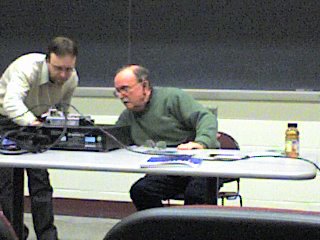SPARK Overview

Greetings from the land of the overwhelmed! After a weekend spent at a Rock conference (see IASPM below), I was asked to review the SPARK Festival of New Music and Art at the University of Minnesota this past weekend. It began on Tuesday evening and lasted through Sunday afternoon, with a nearly full schedule.
The featured artists were Alvin Lucier and Scanner (Robin Rimbaud). Both gave keynote lectures, Scanner on Wednesday and Lucier on Friday. Scanner also performed on Wednesday evening, and some of Lucier's pieces were performed on Friday and Saturday.
I'll go into greater detail in following posts, but I wanted to post some very broad observations about the whole experience. First, the schedule was far too busy. Each day began with 4 papers at 9am (30 minutes each), then a concert at 11:15, then another concert (or panel) at 12:30, another concert at 3, and a final concert at 7:30pm. Following the final concert was a live laptop performance at a local pub (10pm). More often than not, the sessions ran late, forcing the next session to begin late, etc. The end result was a totally exhausted audience.
Both Scanner and Lucier were charming speakers, and I could have listened to either for far longer than the hour or so alotted. Both talked a lot about their musical upbringing and development of a more mature style, and both cited many similar influences (esp. John Cage).
Lucier's music was far and away the best of the week. It is extremely demanding of both performer and audience, and is also incredibly expressive. The other pieces in the festival tended toward the "busy" (throwing every new technique or sound into the composition) and paled in comparison.
Some of the lowlights included a terrible panel discussion on Netlabels - the message we got was "Internet good! Industry bad!" with no real idea that most of what they discussed has already happened (i.e. independant labels in the 30's, 40's and 50's, not to mention Disco) or that they were only approaching this from the label's perspective, and not the artists. One of the panelists actually mentioned that he actively downloads the music of other artists to use in his DJ sets on the weekends without paying or even acknowledging the artists from which he steals music. Yeah, the internet is GREAT!
Other lowlights included a distinct sense of cronyism (more U of MN grad students than other composers combined, and a lot of Columbia grad students, for example), concerts that went on for far too long (one lasted OVER three hours - it had 11 pieces), offensive pieces (a NY improvisational group that featured two amplified violins, two electric guitars and an amplified piano, not to mention video and live computer sounds), and many many pieces that featured technology used in rudimentary forms. By that I don't mean to suggest that the pieces weren't well crafted - I don't have many of the skills that some of these first year master's students do in terms of tech knowledge. However, almost all (and by that I mean over 90%) of the pieces featuring live electronics used the same tired model of the computer as effects pedal. If the performer gets loud, the effects get loud. If the performer plays fast, the effects go fast....etc. For such a long and potentially varied festival, I would have liked to hear more, well, variety or compositional technique.
Oh, I heard one silence that was over a second, and that was a sectional boundary in one piece.
There were plenty of highlights, too. The spaces were very interesting, ranging from inside art galleries to a stunning performance space (the Southern Theater). The audiences were great and nearly every performance was packed. There were a number of installations, including a guerilla installation or two. Some pieces were quite good, even if they did follow a particularly outdated model, and I surprisingly enjoyed some of the multimedia pieces. Again, the Lucier works were an absolute joy and I really loved those.
Overall, I'm happy to have spent the week there, even if it was exhausting (the hour drive each way wasn't any fun). And Wanna visited for the final three days of the festival, so we got to catch up and plan a bit for the future too.
MORE TO FOLLOW AS I WRITE THE FORMAL REVIEW.



3 Comments:
So, did Senor Twombly or the author of the comment remove the other comment??? More importantly, what did it say???
Seriously, your comments thus far have been reminiscent of my experience at the SEAMUS National Conference last year in Muncie, IN (minus the good pieces by Lucier). I remember the cramped schedule and also found the concentration on a limited set of aesthetics (drones and granular synthesis to be more specific) to be disappointing. What I found most interesting was the fact that the pieces by student composers were by and large much better than those submitted by composers with academic positions (leading me also to wonder about the role of cronyism).
The author of the post removed it himself! That's okay - I know who you are ;-)
Oh, and a quickie remark about student compositions being better than those with positions: I was a little surprised to hear that some composers were accepted to this festival without a finished submission! And my feeling is that this practice is common.
Post a Comment
<< Home